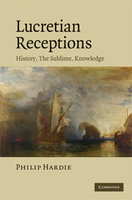
Philip Hardie, Lucretian receptions: history, the sublime, knowledge, Cambridge; New York: Cambridge University Press, 2009. ix, 306 p.
- $90.00.
- ISBN 9780521760416.
Recension par David Butterfield (Christ's College, Cambridge) dans Bryn Mawr Classical Review 2010.09.23.
Extraits en ligne sur amazon.fr.
Présentation de l'éditeur:
Lucretius' De Rerum Natura, one of the greatest Latin poems, worked a powerful fascination on Virgil and Horace, and continued to be an important model for later poets in and beyond antiquity, including Milton. This innovative set of studies on the reception of Lucretius is organized round three major themes: history and time, the sublime, and knowledge. The De Rerum Natura was foundational for Augustan poets' dealings with history and time in the new age of the principate. It is also a major document in the history of the sublime; Virgil and Horace engage with the Lucretian sublime in ways that exercised a major influence on the sublime in later antique and Renaissance literature. The De Rerum Natura presents a confident account of the ultimate truths of the universe; later didactic and epic poets respond with varying degrees of certainty or uncertainty to the challenge of Lucretius' Epicurean gospel.
Philip Hardie is one of the leading critics of Latin literature in the world today. This book contains both revisions of previously published articles and new chapters. He is a Senior Research Fellow at Trinity College, Cambridge, and Honorary Professor of Latin Literature in the University of Cambridge. He is also a Fellow of the British Academy. His previous publications include Virgil's Aeneid: Cosmos and Imperium (1986), Virgil's Epic Successors (1993), and Ovid's Poetics of Illusion (2002). He is editor of The Cambridge Companion to Ovid (2002) and co-editor of The Cambridge Companion to Lucretius (2007).
Table des matières:
List of illustrations viii
Acknowledgements ix
Introduction 1
I Time, history, culture 11
1 Cultural and historical narratives in Virgil's Eclogues and Lucretius 13
2 Virgilian and Horatian didactic: freedom and innovation 41
II Sublime visions 65
3 Virgil's Fama and the sublime 67
4 The Speech of Pythagoras in Ovid Metamorphoses 15: Empedoclean epos 136
5 Lucretian visions in Virgil 153
6 Horace's sublime yearnings: Lucretian ironies 180
III Certainties and uncertainties 229
7 Lucretian multiple explanations and their reception in Latin didactic and epic 231
8 The presence of Lucretius in Paradise Lost 264
List of works cited 280
Index of passages discussed 297
General index 303